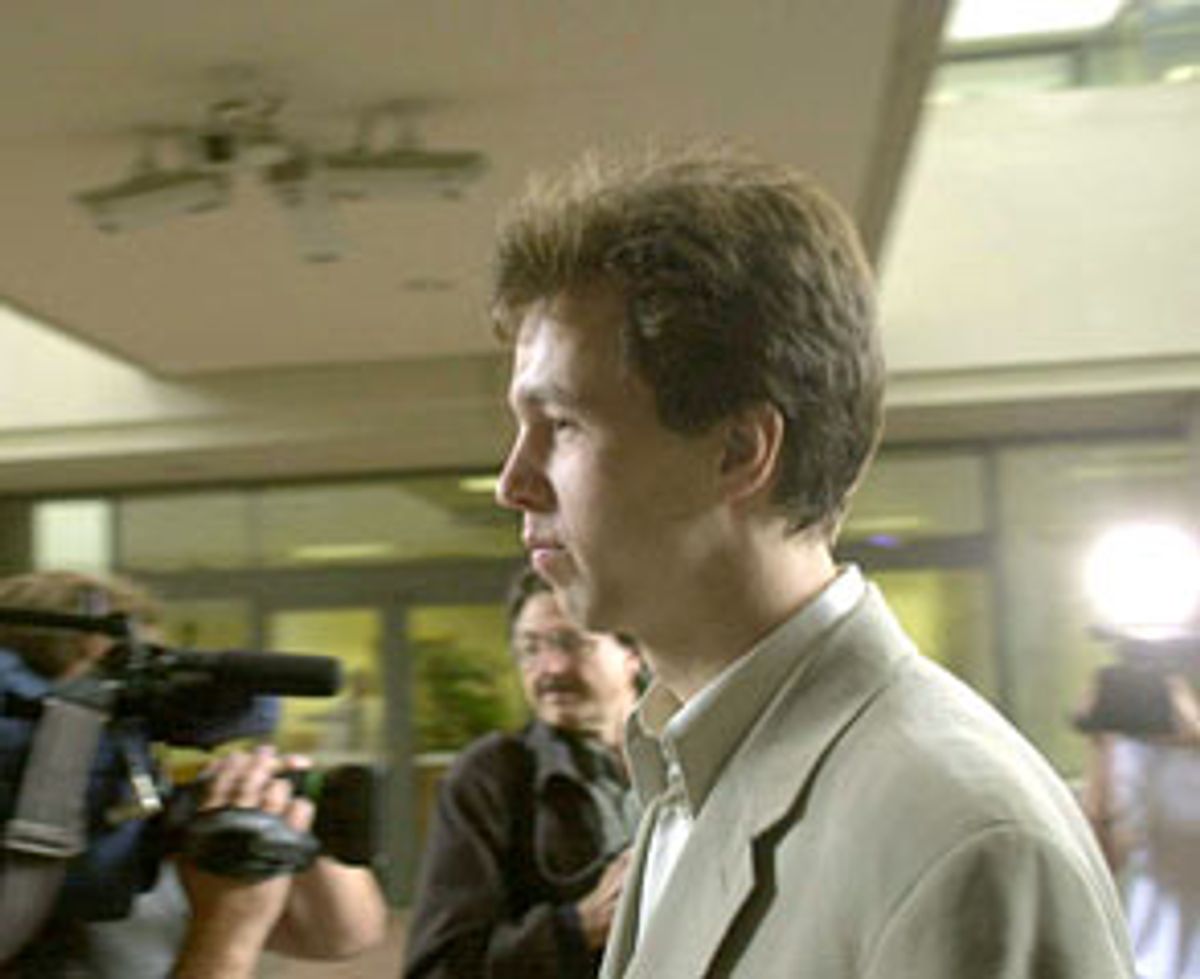The federal government's case against the Russian software firm ElcomSoft -- the first criminal trial under the controversial Digital Millennium Copyright Act -- seems to be in legal limbo after two key witnesses were refused entry into the United States in mid-October.
The American Embassy in Moscow has denied U.S. visas to Dmitry Sklyarov -- the Russian programmer jailed in California last year after the government accused him of violating federal copyright law -- and his boss, ElcomSoft's CEO, Alexander Katalov.
The company is accused of violating U.S. law by selling software that strips Adobe eBooks of their copy-protection. Sklyarov and Katalov, who live in Russia, were due to testify in the case, which is scheduled to begin Oct. 21 in San Jose, Calif.
According to Judy Trummer, a spokeswoman for ElcomSoft, the embassy did not specify a reason for the visa denials. The trial, Trummer said, would likely be rescheduled. News of the embassy's decision, issued on Oct. 10, was first reported on the Web site Planet PDF.
Trummer said that ElcomSoft's immigration attorney, Marina Serebryanaya, is asking the embassy to reverse the decision. Serebryanaya could not immediately be reached for comment, but she told Planet PDF that Katalov's and Sklyarov's visa applications specified that they were coming to the U.S. as witnesses in the trial.
Trummer said that Serebryanaya and Joseph Burton, ElcomSoft's defense attorney, would discuss with the court the immigration complications at a pretrial hearing in San Jose on Thursday morning.
It's anything but certain that the visa decision will be reversed. According to immigration lawyers, a consular office's decision cannot be appealed; reversing a visa denial is more a business of perseverance and persuasion than it is about going through a well-defined process.
"The consular office has the authority of God," said Greg Siskind, of Siskind, Susser, Haas & Devine, a Memphis immigration law firm that runs the Visalaw.com site. "The only thing a lawyer can do is seek an opinion from the visa office in Washington, but even they are powerless to change the decision."
The visa denial would seem to hurt the government's case as much as it hurts ElcomSoft's. Katalov, the CEO, is a crucial witness for the company; Sklyarov, who agreed to testify in the case against the company in return for the government's dismissal of the charges against him, is a crucial witness for the Justice Department. (Assistant U.S. attorney Ross Nadel, who heads the Justice Department's cybercrimes unit, declined to comment on the visa denial.)
Siskind, the immigration expert, says it's highly unusual for an embassy to deny visas to people who make clear that they're going to the U.S. only to participate in a trial. The pair can reapply for a visa, and the court could provide documentation to prove that they are needed in court. "Otherwise, if I were the judge, I'd want to relocate the trial overseas or dismiss the whole matter altogether," Siskind said. "That would be the only fair thing to do."
According to news reports, American consular offices have been more careful in granting visas since Sept. 11, 2001, for security reasons, but Katalov has been granted visas since then.
The main reason most visas are denied, Siskind said, is "when they think they're going to stay permanently in the U.S."
The irony in this case is that the last time Sklyarov came to the United States -- in July of 2001, on what he thought was a routine trip to demonstrate his code at DefCon, a hacker conference in Las Vegas -- his stay did last longer than he had intended. That's because he was arrested at his hotel room and held in jail for three weeks.
The jailing of Sklyarov, a Russian citizen, prompted a global outcry over the reach of U.S. copyright law, with cyber civil-libertarian types holding street protests over the matter. The attention may have eventually encouraged Adobe to ask for Sklyarov's release, and it possibly led to the deal that let Sklyarov personally off the hook.
Even though the protesters said the case provided a vivid example of why the DMCA is too broad and ought to be declared unconstitutional, the defense in the case has lost all motions seeking that determination.
In the spring, Joseph Burton, ElcomSoft's lead attorney, argued that that the DMCA was unconstitutional because it was both too vague and because it violated the First Amendment.
In one of the few judicial decisions regarding the DMCA's constitutionality, U.S. District Judge Ronald Whyte of San Jose disagreed on both counts. Whyte ruled that while computer code is a form of "speech," as many programmers have contended, the DMCA did not unreasonably stifle that speech.
"In the digital age, more and more conduct occurs through the use of computers and over the Internet," Whyte wrote in a decision issued on May 8. "Accordingly, more and more conduct occurs through 'speech' by way of messages typed onto a keyboard or implemented through the use of computer code when the object code commands computers to perform certain functions."
"The mere fact that this conduct occurs at some level through expression does not elevate all such conduct to the highest levels of First Amendment protection. Doing so would turn centuries of our law and legal tradition on its head, eviscerating the carefully crafted balance between protecting free speech and permissible governmental regulation."



Shares